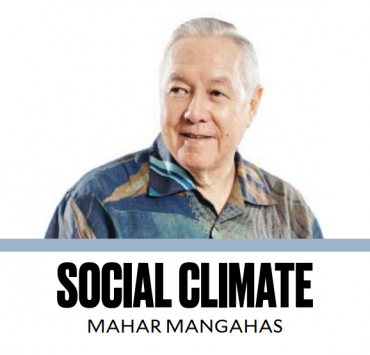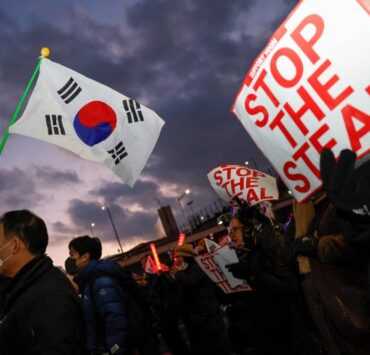A look at Asia’s 2024 winners and losers

As 2025 begins, we look at the winners and losers in the Indo-Pacific region in 2024, who had it good and who had it bad. Here is our Asia Year-in-Review 2024.
Worst year: Asia’s climate casualties.
2024 was a year of mounting casualties from typhoons, floods, heat waves, and droughts across Asia. These included Typhoon Yagi (Severe Tropical Storm “Enteng”, one of the strongest storms to hit Southeast Asia in years. Yagi left a path of death and devastation in November. From the Philippines through southern China and Vietnam and onto Laos, Thailand, and Myanmar, the storm killed hundreds and devastated communities and livelihoods.
Floods from the yearly monsoon rains also left millions displaced and hundreds dead in Afghanistan, Bangladesh, Pakistan, India, and Nepal, making this year one of the deadliest in recent memory. And if it was not record-breaking rainfall, it was drought accompanied by scorching temperatures leading to months of severe water shortages.
With extreme weather events seemingly more common and their victims too often increasingly unnoticed and forgotten, the region’s climate casualties garner the dubious distinction of Worst Year in Asia.
Bad year: East Asia’s babies.
In marked contrast to the situation in relatively youthful and growing nations like India, Indonesia, and the Philippines, aspiring grandparents across East Asia might have a critical question: Where are all the babies?
In 2024, record-low fertility rates continued to prove a major concern in South Korea, China, Japan, Taiwan, and Hong Kong. Fertility rates across East Asia remained well below that needed for a stable, if not growing, population.
The long-term economic consequences could be significant as nations contend with shrinking workforces and aging populations. Women are having very few to no children. Changing gender roles, long work hours, and the high cost of housing, education, and childcare are all cited as some of the factors behind this East Asia demographic trend. In March, the Japanese government announced that Japan’s birth rate was the lowest it had ever been since the country first collected the statistics in 1899. In December, South Korea was declared a “super-aged” society with one in five people aged 65 or older.
The so far seemingly losing battle against declining birthrates in these nations continues.
Mixed year: Democracy & incumbency.
In an era of discontent, being an incumbent is no easy matter. From India to Indonesia, and Pakistan and Sri Lanka to Taiwan, elections were very much on the 2024 calendar across the region. At year’s end, however, it proved a decidedly mixed year for not just incumbent politicians but for democracy itself.
The year began with longtime leader and Bangladesh Prime Minister Sheikh Hasani winning reelection overwhelmingly in an election boycotted by the opposition, only to resign and flee the country months later after weeks of student protests.
As a perhaps bewildered world looked on, the year ended with South Korea’s President Yoon Suk-yeol declaring martial law eight months after his party lost big in general elections. The National Assembly then successfully moved both to force the lifting of martial law and then to impeach him as well as his acting successor.
Yet, elections cemented a vibrant democracy in Taiwan, forced India’s President Narendra Modi to govern with a coalition, surprised the Pakistan incumbent, and continued the record for peaceful transitions of presidential power in Indonesia. Diverse, mixed democratic trajectories for a diversity of democracies in Asia characterized 2024.
Best Year: Moo Deng.
Thailand was home to the year’s winning and winsome social media sensation. To say that the female baby pygmy hippo Moo Deng, Thai for “bouncy pork,” took the world and 2024 by storm, would be an understatement.
Born in July at Thailand’s Khao Kheow Open Zoo, the “hyper-viral” baby pygmy has seen her memes, photos, and videos go global.
Fan accounts on X, TikTok, and Facebook continue to proliferate. And even NBC’s long-running US comedy show “Saturday Night Live” got in on the “Moo Deng mania.” Asian American star Bowen Yang impersonated the baby hippo on the show’s “Weekend Update” segment, lamenting the hazards of instant fame.
But Moo Deng isn’t just another pretty face. She correctly predicted the winner of the 2024 US presidential race by selecting the fruit and vegetable plate bearing Donald Trump’s name over that of rival Kamala Harris.
As the region looks to the return of Trump to the White House in 2025 and to what might well be a tumultuous year ahead, here’s to a more joyful and hopeful new year ahead. The Jakarta Post/Asia News Network
—————-
Curtis S. Chin, a former US ambassador to the Asian Development Bank, is managing director of advisory firm RiverPeak Group. Jose B. Collazo is an analyst focusing on the Indo-Pacific region.
—————-
The Philippine Daily Inquirer is a member of the Asia News Network, an alliance of 22 media titles in the region.





















